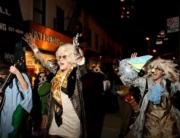The initial moments of this combustible documentary set the tone for everything that follows. In the foreground, a trio of teenage girls take selfies, while in the background, some boys fire an automatic rifle, spraying bullets everywhere.
It’s a scene many responsible parents wouldn’t want their child around, but then so much of Cusp is set away from prying eyes. Friends Brittney, Aaloni, and Autumn live in the same Texas sprawl and hang out a lot during the summer. Judging from an early montage set to a pulsating soundtrack, this means a lot of partying, drinking, drug use, and riding around in trucks with boys.
The main plot points involve the stuff of typical teen angst—boyfriends, break-ups—but because the narrative takes place exclusively during summertime, when neither the girls nor their peers have school to occupy their thoughts or libidos, a layer of emotional intensity is added. Often the documentary seems to be trying to view the world through their hyper-emotional eyes. When Autumn’s romance flames out, subsequent scenes of her are accompanied by mopey synthesizer music and close-ups.
From the start, the filmmakers utilizes voice-overs to help us get to know the three. Autumn is the most introverted, while Brittney views herself as more mature than the average peer her age, which is why she prefers hanging out with older kids. But this is also how we find out each has experienced trauma. Both Brittney and Autumn were sexually abused by friends of their parents, while Aaloni has long endured an ill-tempered father who might have some form of post-traumatic stress disorder (and who, despite never appearing on camera, looms menacingly over Aaloni’s family’s lives).
In addition, directors Parker Hill and Isabel Bethencourt employ a vérité approach that makes us forget at times that the camera is there. In scenes where many are crammed together in a bedroom, the conversations feel natural and not at all mannered. Despite the presence of the camera, the boys in the girls’ orbit cannot help appearing oversexed and more than vaguely threatening as they make light of rape and what constitutes consent.
Sex is very much on the of minds of Brittney, Aaloni, and Autumn as well, and their willingness to speak frankly about their own experiences leads to some of the more disheartening moments of Cusp. It isn’t just that the topic of rape comes up often, but there is the implication it may have actually happened to one of the girls over the period of filming.
We come to care, and worry about, the teens as they aren’t exactly surrounded by figures who can offer guidance or stability when needed. On the contrary, the film seems to take place in a world full of adults who can be as problematic as those half their age. During a random soccer game, the camera catches parents of two players having a pointless argument that almost escalates into a brawl. Aaloni’s mother, meanwhile, constantly talks tough in front of her kids, yet when her spouse becomes verbally abusive, she does nothing to actually protect them from his wrath. The only grown-up who emerges unscathed is Autumn’s dad, who doesn’t crowd her and gives her sage advice when she needs it.
As heavy as Cusp mostly is, the main subjects emerge on the other side of their bad experiences, and it’s actually remarkable seeing them change—not just physically but emotionally as well—before our eyes. In addition, the film is full of evocative images that capture the state of being young and aimless. From a darkened parking lot illuminated solely by the backseat of a car, in which several of the subjects are huddled, to a foreground shot of someone treading silently, back and forth across a rooftop, these moments are simultaneously infused with the energy of youth and aching loneliness.
Overall, the film boldly explores how being a teenage girl means existing in a veritable minefield of sorts, but it also depicts the resilience by which she finds her way out.







Leave A Comment